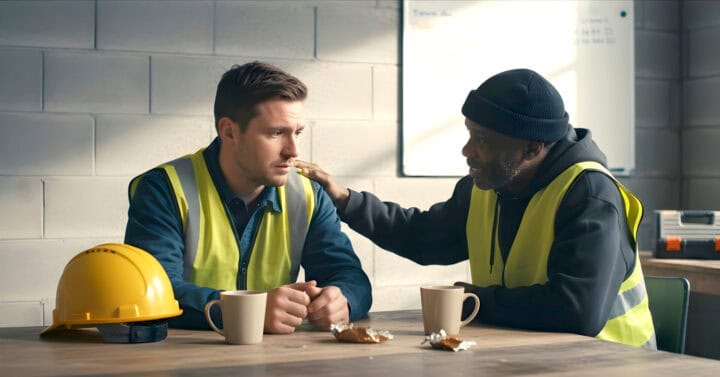Ask any tradie what the toughest part of the job is and most will talk about long hours, heavy lifting, or the weather beating down on site. What often stays hidden is the mental load that comes with the work. Stress, pressure, and silence have become a dangerous mix in the construction industry.
The statistics are stark. Construction workers face a suicide risk 3.7 times higher than the national average. More than half of workers say they do not feel comfortable talking about mental health at work. Behind those numbers are real people, real families, and real mates lost too soon.
Mental health in the construction industry is still wrapped in stigma. Many feel they cannot speak up for fear of being judged as weak or not up to the job. But silence is costing lives. It is also hurting productivity, safety, and the future of the trade. It is time to break that silence.
Why mental health awareness matters
Mental health is not a side issue. It is central to the well-being and safety of every site.
- Safety: A worker under stress or suffering from depression may be distracted, exhausted, or careless, increasing the risk of accidents.
- Well-being: Poor mental health affects sleep, relationships, and physical health. The knock-on effect is massive, both on and off site.
- Productivity: A crew that feels supported will work harder, stay longer, and deliver better. High turnover, absenteeism, and burnout cost businesses as much as any material shortage.
Mental health is not about being “soft”. It is about making sure everyone goes home safe and in one piece, every day.
The stigma in construction
Construction has long had a culture of toughness. “Get on with it.” “Man up.” “We all feel the pressure.” Those words get thrown around more often than offers of support.
That culture builds walls instead of bridges. Workers fear they will be seen as weak, unreliable, or a burden if they admit they are struggling. Apprentices worry about reputation. Older hands bottle it up because they have “always done it this way.” Managers avoid the topic because they do not know how to handle it.
The result? Stress festers. Anxiety builds. Depression deepens. Too many suffer in silence until it is too late.
The hidden pressures on tradespeople
It is no wonder the industry struggles. Construction workers face unique pressures that many outside the trade do not see.
- Job insecurity: Many roles are short-term, with uncertainty about where the next job comes from.
- Long hours: Early starts, late finishes, weekend work, and travel grind people down.
- Financial strain: Tool theft, late payments, and rising material costs pile on financial stress.
- Isolation: Lone working or moving from site to site means little chance to build steady support networks.
- Physical toll: The strain on the body from heavy lifting and repetitive work adds to fatigue and stress.
When you stack all those pressures together, it is no surprise that tradespeople need extra mental health support.
Steps to foster a supportive environment
Change is possible. Here are some practical ways to make construction a healthier, safer place for mental well-being.
1. Start with toolbox talks
Toolbox talks are a normal part of site life, usually covering safety, equipment, or hazards. Why not make mental health part of that routine? A short, honest chat about stress or pressure makes the subject normal, not taboo.
2. Promote available resources
Many organisations already provide support for construction mental health. Share their details openly. Put posters on site walls, include helpline numbers on payslips, and add them to staff handbooks. A few key resources include:
- Band of Builders – workplace mental health support for the construction industry.
- Lighthouse Club – a charity offering a free and confidential helpline, text support, and financial aid.
- Samaritans – always available for anyone struggling, inside or outside the trade.
3. Train leaders and supervisors
Managers and supervisors set the tone. If they avoid the subject, so will the crew. Training leaders to recognise the signs of stress, have supportive conversations, and signpost help can change the culture.
4. Encourage peer support
Not every conversation needs to be with a manager. Sometimes a mate on site is the best person to notice a change. Encourage workers to look out for each other and speak up if someone seems down.
5. Normalise the conversation
The more mental health is talked about, the less scary it becomes. Share stories, invite speakers, or run awareness weeks. The goal is to make talking about stress as ordinary as talking about safety boots or PPE.
6. Provide flexibility where possible
Small changes to schedules, breaks, or workloads can make a big difference. Allowing a worker time to attend a counselling session or giving more notice about shifts shows respect and care.
7. Lead by example
When leaders are open about their own struggles, it sets the tone for everyone else. Honesty builds trust. Saying “I have been stressed too” is more powerful than pretending everything is fine.
Signs someone might be struggling
Spotting mental health issues is not always easy, but there are clues. Look out for:
- Sudden changes in behaviour or mood
- Increased absenteeism or lateness
- Withdrawal from colleagues
- Drop in work quality or focus
- Signs of substance misuse
If you see these patterns, do not ignore them. A simple, private “How are you doing?” can open the door.
The role of industry leaders
The responsibility does not sit only with individual workers. The wider construction industry must step up.
- Employers should provide access to support services and build mental health into safety policies.
- Unions should continue pushing for better protection and resources.
- Merchants and suppliers can sponsor campaigns and raise awareness.
- Government and regulators must recognise that construction mental health is a national issue, not a niche one.
When the whole industry pushes in the same direction, culture can change.
Stories from the trade
Across the UK, more tradies are beginning to speak up. Podcasts, forums, and social groups are sharing real experiences. Plumbers like Andy Cam and heating engineers like Todd Glister have opened conversations about stress and financial pressure in the trade. Their honesty helps others realise they are not alone.
The last word
Construction has a proud history of toughness and graft. But toughness should not mean silence. The statistics on mental health in construction are too serious to ignore. Workers face a suicide risk 3.7 times higher than average. Over half still feel they cannot talk about it. That has to change.
Awareness is the first step. Talking openly saves lives. Promoting resources connects people with help. Training leaders builds supportive crews. And peers looking out for each other makes sites safer and stronger.
Mental health awareness in construction is not about weakness. It is about safety, productivity, and dignity. It is about making sure everyone in the trade has the chance to go home at the end of the day, not just physically safe but mentally steady.
Breaking the silence is hard. But it starts with one conversation at a time.

